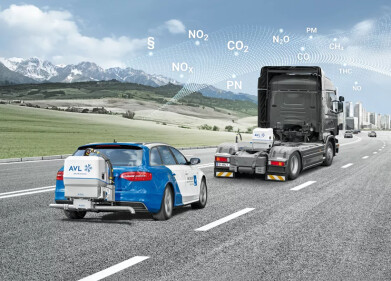Air Monitoring
How Mums For Lungs is Changing UK Air Quality Regulation, According to its Founder
Oct 24 2022
Established in 2017, Mums For Lungs is a volunteer organisation dedicated to improving air quality in the UK, running various campaigns to change public behaviour and encourage regulatory action. In the last few years, the organisation has played a pivotal role in getting air quality on the agenda, with particular success in London. Indeed, with this year’s announcement of a London-wide ULEZ, a concept for which the organisation has campaigned since 2018, Mums For Lungs has become an effective force for change.
Recently, EnvirotechOnline sat down with Jemima Hartshorn, founder of Mums For Lungs, to discuss their work, the state of the UK’s air quality regulation and what the future might hold for British air.
First off, Mums For Lungs has an interesting backstory. Would you mind telling us a little about the origins of the organisation?
Of course! So, I was on maternity leave in 2016 for the first time in my life. I lived in Brixton at the time, very close to the monitor which would exceed annual limits by the 5th of January every year. I just got really worried about air pollution. You know, I had this tiny baby in the pram and I started thinking: “Oh my God, there’s cars! How is he going to cycle? What is he breathing? The pram is so close to the exhaust!” and stuff like that. So, I started reading about it, talking to other parents about it. There were a bunch of us who were on parental leave at the time and were worried about it, so we got together, with as many parents as babies in the room at the beginning! We have been going ever since, trying to turn our anxieties about the health impacts of air pollution into action that will actually drive progressive change in cleaning up the air.
Since this inception, you've organised a number of successful campaigns that have secured commitments from government. I’d like to speak briefly about one of the most consequential, the School Streets initiative, started back in 2019. What is the School Streets initiative, what has it achieved and what can it tell us about the impact that municipal planning can have on air pollution?
School Streets is a scheme whereby the road by a school will be closed at drop-off and pick-up times, for about an hour to one and a half hours depending on the location and the time-period that it starts. During that period, depending on the enforcement, either no cars can go down that road - if you put up bollards, which “extends” the pavement, as it were, kids can cycle, scooter in the road, parents and careers are much less worried about children that we’re taking with us to school; you know, usually, people who are doing the school run often have other smaller kids running around at the same time, so it’s quite a scary and hectic environment. In other cases, the enforcement of a School Street is done through an ANPR [automatic number-plat recognition] camera, which means that only cars that have a permit to go into or leave that road can do so without being fined.
The rationale for the scheme, which started in Scotland and was then pioneered in Hackney (a borough of London), is that children breathe huge amounts of air pollution on the school run - it’s a disproportionate amount of the pollution that children are exposed to throughout the day. When they really need a good start or a good end to their day of learning, they breathe fumes, fumes, fumes. And we knew that in London, vast amounts of the rush hour traffic are actually parents doing drop-off or pick-up. So, School Streets tackle both: they really discourage parents from driving, because you can’t stop by the school gate anyway, and they create a much healthier, less polluted environment for children to start and end their day in.
Now, let’s learn a little about a few of your more recent and ongoing campaigns. In May, you began a campaign to curb wood burning. Why is it necessary to discourage the burning of wood and what changes are you asking the government to make?
I think mankind has a strong relationship to wood-burning, we perceive it as something cosy and many people like the smell. The reality is, unfortunately, really grim. A fire or any kind of combustion, an open fire or even a DEFRA-approved eco-stove, will emit huge quantities of tiny, tiny particles, so-called PM2.5. Our lungs, which are our bodies’ filtration systems, are not made to filter out these tiny particles. Whereas dust in most cases will be filtered by the lungs, PM2.5 is so small that it surpasses the lungs – it's been found in placentas and found in brains. The pollution, that is, these tiny bits of dirt, or rubbish, or whatever you want to call them, can settle anywhere in our body and cause harm, resulting in stunted lung growth and contributing to cancers.
Wood-burning, unfortunately, is a major, major source of this sort of air pollution. It’s obviously worse where it’s happening. So, if you’re burning inside your home, your living room is going to be the worst place, but it will be all over. It’ll be your neighbours, as well, who are strongly affected and may feel that they can no longer sit in their garden, or that no matter what they do, their kids’ bedroom is full of air pollution. That is why it’s a really important issue to address, especially considering that the vast majority of people who burn wood actually have other sources of heat!
In terms of government action, firstly, I would like to see a really clear, strong campaign openly talking about this issue. Secondly, we would like to see stoves that are being sold in shops to be coming with health warnings, just like cigarettes. Basically, though, we want government to commit to phasing out the sale of new wood-burners and stoves, and to ensure that wood-burning in domestic settings, at least in cities, is ended by the end of this decade
Another ongoing campaign of yours has been organised around the prevention of idling, an infamously difficult problem for regulators to solve. Have you found any particularly effective strategies and how do you think governments can help to address this problem?
Idling is a really interesting one. The problem with idling is that it’s such a habit, most people are completely unaware of what they’re doing - you know, you sit down in your car, you turn on the engine, you get your phone out, you’ve got some messages, you listen to the voicemail and suddenly, it’s been ten minutes of sitting there! All that time, the fumes out the back of the car have been on the pavement and the kids are having to walk through it. That’s why we’d like to see this stopped, this complete waste of fuel and money in the production of air pollution.
It is inherently difficult to address but the problem, really, in the UK is the laws. Traffic wardens do not have the powers to fine people immediately, they have to ask them to turn off their engines, and they would then have to restart their engines in order to get a fine, so it’s a really ineffective way of doing it. Interestingly, in New York, any bystander can film a car that’s idling, send it in, and the idling driver will be fined anywhere between $350 and $2,000, and the person reporting them will get half of that! Suddenly, you have a real incentive for people to look out for idlers, and once you’ve been fined that much for idling, you’re going to rapidly start thinking about what you do first when you get into a car.
Saying that, of course, it’s still difficult. I think that most people are just unaware of what they’re doing. So, we’ve been running awareness campaigns, handing out informational leaflets to idlers, to try to prompt behavioural change. But in the UK, we still lack an effective strategy for addressing idling.
Now, in the past, Mums For Lungs has been fairly critical of the national government’s approach to air quality. For example, as part of the new Environment Act, passed last year in 2021, DEFRA – the Department for Environment, Food and Rural Affairs – recommended two new air pollution targets earlier this year. They recommended a new average concentration of 10 micrograms per meter cubed by 2040 and, using 2018 as a base year, a 35% reduction in population exposure, also by 2040. DEFRA characterised these targets as “ambitious environmental improvements.” You’ve been publicly skeptical of this characterisation and Mums for Lungs has campaigned for more amitious targets during the consultation period, earlier this year. What were your criticisms of these recommendations and where are we at with these targets?
In recent years, the evidence on the harms of air pollution has amounted hugely and the research emphasises that even very, very small levels of air pollution are incredibly harmful. Accordingly, the World Health Organisation (WHO), changed its recommended air pollution targets in September 2021. They are significantly lower than those recommended by DEFRA, now.
The WHO believes that PM2.5 is so incredibly harmful that it needs to be under 5 μg/m3. For nitrogen dioxide, DEFRA’s current target is 40 μg/m3, but the WHO think it needs to be under 10 μg/m3, a quarter of our current limit, which has not been updated. Further, the World Health has been really clear that these targets need to be achieved as soon as possible. For a national government to be aiming for something that is twice as high as the recommendations and not wanting to commit to achieving even these excessive targets for another 18 years, this means that loads more people - we’re talking hundreds of thousands, here - will be sick and dying from air pollution in the UK prematurely, unnecessarily. Currently, 40,000 people die every year in the UK from air pollution, purely unnecessarily - if air pollution were lower, that wouldn’t happen. That is why we were really clear that this is not good enough.
Even further, the Clean Air Fund has done some really, really great research, looking into how soon WHO-recommended levels could be achieved in the UK. Their conclusion was that the WHO’s limit of 10 μg/m3 could be achieved by 2030. So, we are waiting with crossed fingers to hear what the outcome of this consultation will be. By the 31st of October, the government has to announce its new air quality targets, we hope that they listen to the thousands of people who had their voice heard and are aiming for 10 μg/m3 of PM2.5 by 2030 – which, it must be noted, would still be twice as high as the WHO recommends, in one of the richest nations in the world.
On the opposite end of the spectrum, some positive news, Mums for Lungs has been an ardent supporter of the Mayor of London’s plans to extend the Ultra-Low Emission Zone to all of London. Fill us in on the specifics of the plan and exactly why you think it’s a breath of fresh air.
Well, I have to caveat this. There was a big consultation on this scheme and we’re still waiting to hear if the Mayor of London is going to go ahead with it.
But in 2019, the Mayor of London brought in an Ultra-Low Emission Zone, which meant that all cars which are in petrol-terms, older than 15 years or in diesel-terms, older than 6 years (so, Euro 6 and Euro 4) that drive in a certain area would be charged about £12.50 a day to do so. In central London, that resulted in a massive reduction of nitrogen dioxide emissions, because the oldest cars disproportionately emit nitrogen dioxide, which is a real irritant to the lungs and the whole breathing system. The scheme was expanded to the North and South Circular in 2021, which are notoriously polluted roads. Expanding this zone to all of London is really going to encourage more people to reconsider how they move across London if they own some of these very, very old and polluting vehicles. So, that’s the good news.
The bad news is that more needs to be done. Central London is still very, very polluted, still the most polluted part of London. We are hoping to hear more about zero emissions zones, about an update on the ULEZ in Zone 1 and 2 – could people be charged for driving at all if they don’t have a valid reason, such as mobility issues or needing to transport big things? Basically, a lot more needs to be happening, but this is a really good step for London.
Speaking broadly, what, in your view, are the most pressing air quality issues that need to be addressed in the coming years?
Sadly, diesel is still a major issue, it hasn’t gone away. The vast majority of pollution on the roads comes from diesel vehicles, even diesel vehicles that were built after the Dieselgate scandal emit much more nitrogen dioxide and other pollutants than is compliant. Further, diesel vehicles emit more, the warmer it gets. So, a hot summer day, and we’re seeing more of those across the UK, are particularly prone to being accompanied by huge levels of pollution.
Wood-burning really needs to be addressed. Government needs to step on this full-heartedly, so that no-one is cold in their home or is breathing air from a wood-burner. I cannot get my head around a country as rich as the UK with people facing impossible decisions between feeding themselves and their families, or staying warm (and staying healthy, in this case, as well).
Construction is another big contributor to air pollution and needs a novel approach to ensure that that can be massively reduced.
Finally, I understand that Mum For Lungs relies on the effort of volunteers: how can people get involved?
I would ask and invite everyone to have a look at our website. Drop us an email, find us on social media, we’re around everywhere. We look forward to having a chat with you, talking about how we can support you in your campaign and how you can get involved with one of our campaigns - or, indeed, another local campaign. If you’d rather get involved with a campaign near you, there’s a high chance we know who the local Air Pollution Champions are, as well.
For regular updates on air quality in the UK, stay right here on EnvirotechOnline.
Digital Edition
IET 34.2 March 2024
April 2024
Gas Detection - Biogas batch fermentation system for laboratory use with automatic gas analysis in real time Water/Wastewater - Upcycling sensors for sustainable nature management - Prist...
View all digital editions
Events
Apr 30 2024 Melbourne, Australia
Apr 30 2024 Birmingham, UK
May 03 2024 Seoul, South Korea
May 05 2024 Seville, Spain
May 06 2024 Minneapolis, MN, USA



















